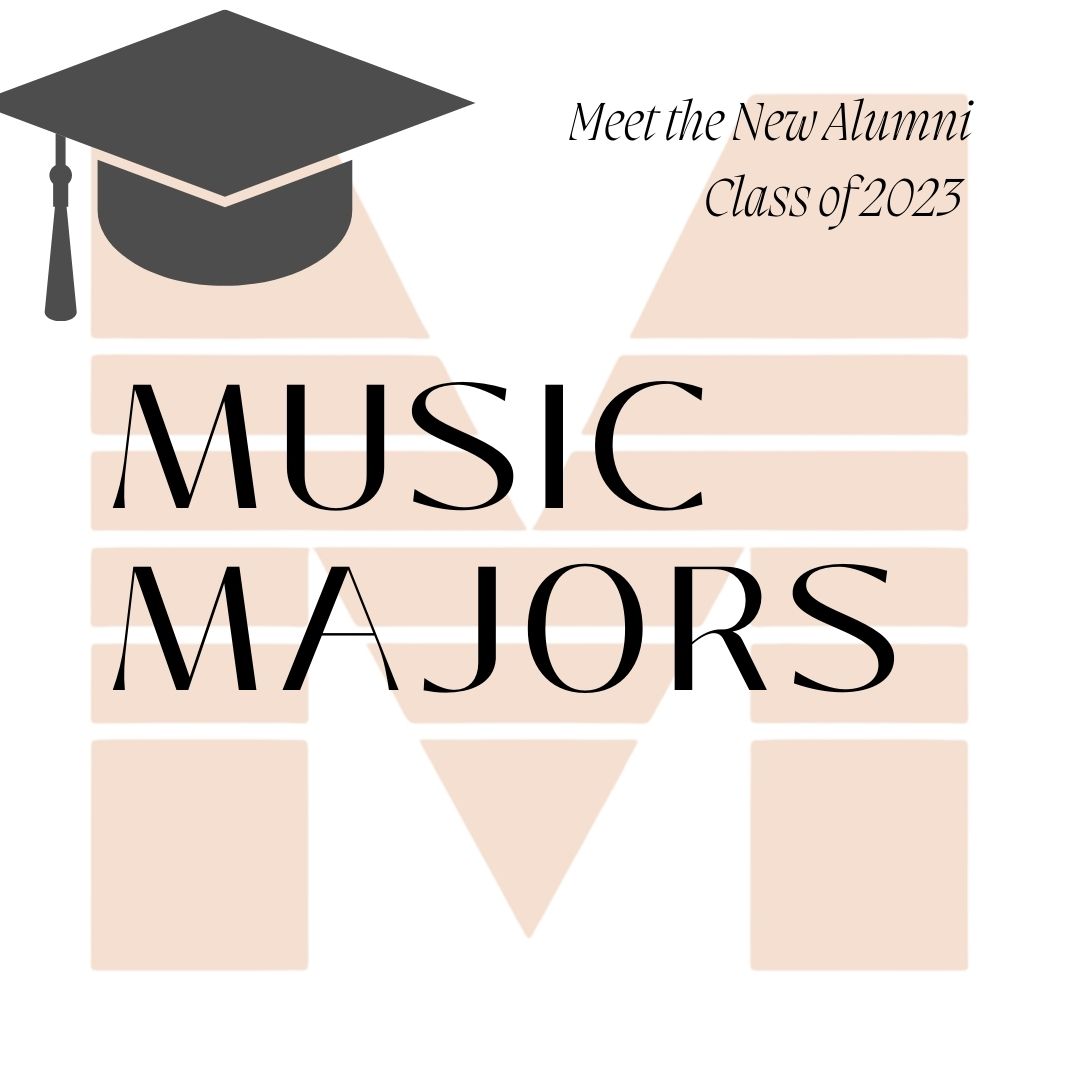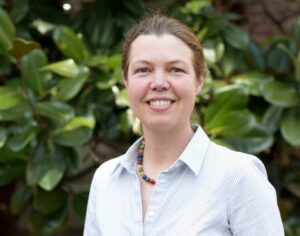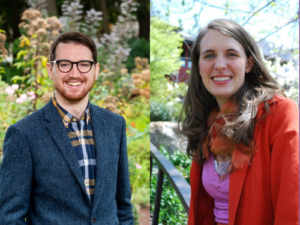The Department of Music applauds the remarkable Music Majors that graduated from our department this spring. These young musicians have made exceptional contributions both to our community and to the University at large, developing groundbreaking musical projects that leveraged the talents and collaboration of peers, serving as dynamic leaders in campus-wide arts programming, and bringing their musical studies to bear on other departments across campus. It is with bittersweet pride that we celebrate their achievements and bid them adieu!
Meet Halle Mitchell
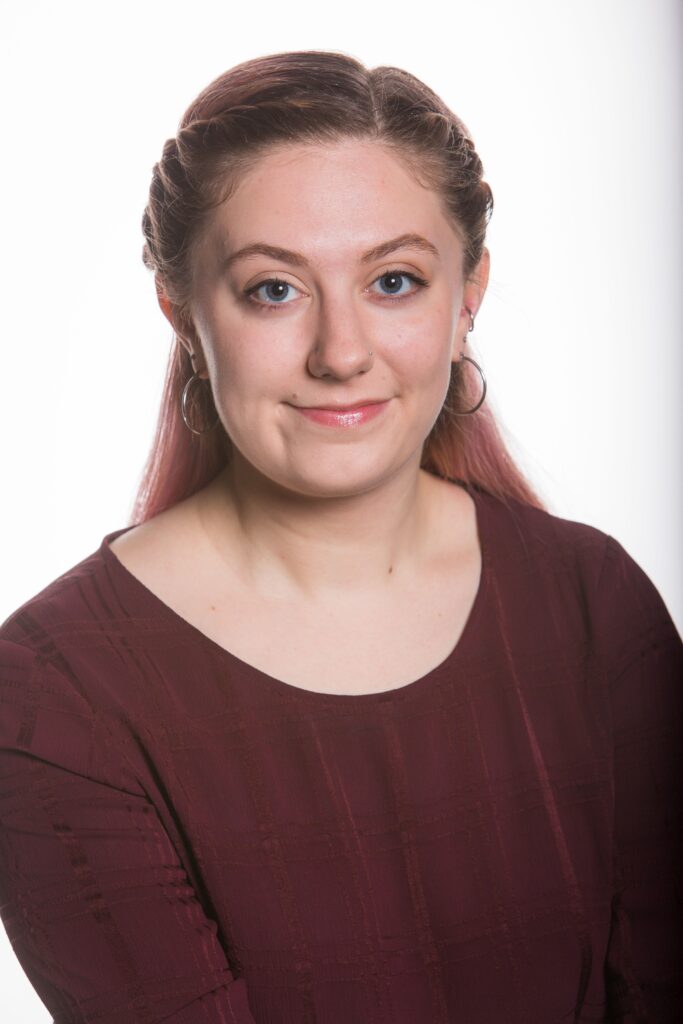
“I switched to being a Music Major at the beginning of junior year because I was really excited to write a musical as my independent work and knew that the Major would allow me a lot of flexibility to bring this project to life.”
Right after graduation, Halle Mitchell, a Music Major with certificates in Music Theater and Statistics and Machine Learning, drove home to Pennsylvania. Did she have big, celebratory plans with family and friends? No, at least not immediately. Instead, Mitchell was rushing home to run a late-night pit rehearsal — a job she’s gotten rather good at — for the local professional summer stock theater where she’ll be music directing this summer. As Halle Mitchell’s advisor Donnacha Dennehy puts it, Mitchell has been a student of “talent and indefatigable energy” since day one. An avid conductor and music director, throughout her four years she participated in myriad extracurriculars across campus, including the Playhouse Choir, for which she most recently served as student conductor; Triangle Club, for which she was also conductor; Katzenjammers, as music director; Princeton University Players, as both music manager and music director; and Glee Club, as a member. These experiences, along with Mitchell’s senior thesis Three Loves, a full-length musical that she wrote, music directed, and produced, which takes its name from the common pop culture theory of the three great romantic loves in a person’s life, have prepared Mitchell in varied ways for her chosen career in music direction for musical theater. Her remarkable energy and impact as a musical leader on campus earned her the particular distinction of winning this year’s Isidore and Helen Sacks Memorial Prize, awarded to students who have made exceptional contributions to the artistic life of the Music Department. This fall, Mitchell will head to the U.K. for graduate studies, but in the meantime, she’ll spend her summer putting into play a principle she learned during her “indefatigable” Princeton years: “Princeton provides so many opportunities that are truly once in a lifetime, but through my four years here I learned to stop constantly looking ahead to the next thing and instead enjoy the present moment.”
“Halle Mitchell has an unerring ability to write a catchy song that not only makes an immediate impact but also lingers in the memory for a long, long time after. Her orchestration is full to the brim with inventive turns. All in all, Halle’s senior thesis was truly an outstanding testament to her talent and indefatigable energy.”
— Donnacha Dennehy, Professor of Music
Meet Jimmy Waltman
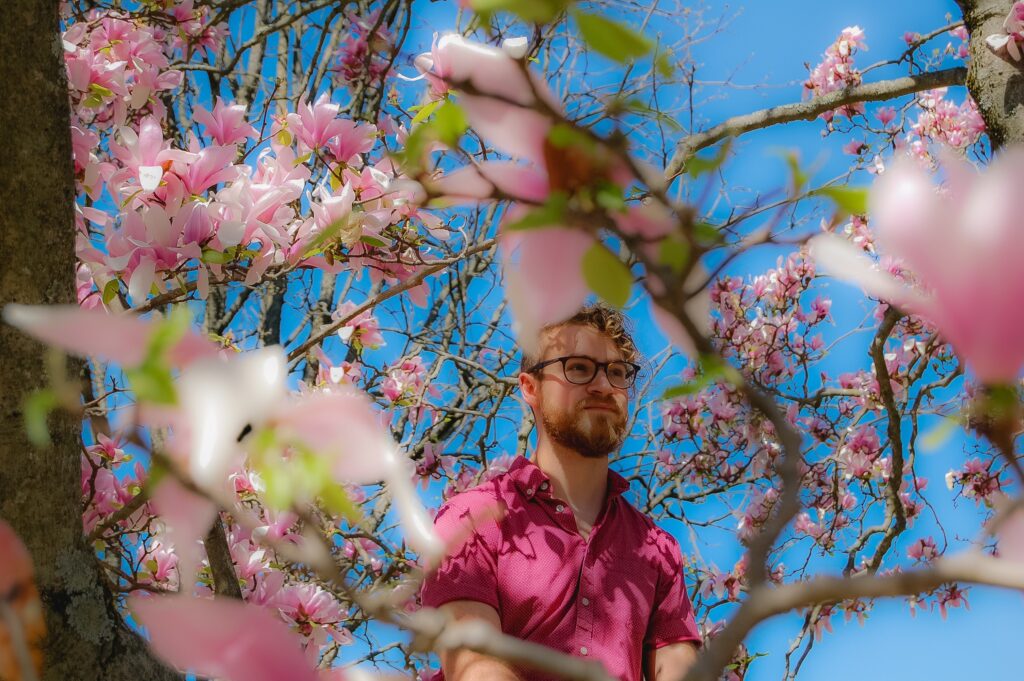
“I think it’s become a sort of mission of mine to show that vocalists should be respected as musicians, and that songwriters should be seen as composers, especially in jazz and contemporary genres.”
Jimmy Waltman wanted to get as close to a conservatory degree as possible. A Music Major with certificates in Jazz Voice and African American Studies, he devoted his four years to a series of impactful and expansive musical projects that left an indelible mark on our department and earned him the distinction of being awarded the Edward T. Cone Memorial Prize for mastery in multiple areas of music. Through early projects, Waltman cut his compositional teeth on such works as his pandemic-year “Ballad of an Early Summer Night” for full jazz big band, written for Darcy James Argue’s MUS261 jazz arranging course. “This was the moment that made me identify not just as a vocalist and lyricist, but as a composer,” he shared. Two years later, his thesis, The Blossom — a ten-song album meditating on spirituality, manifestation, and self-actualization, which uses imagery from nature to trace a year unfolding — would serve as the culmination of four years of exploration and collaboration as he recorded it in full on campus with the willing support of Music faculty, staff, and friends. Collaboration has long been core to Waltman’s musicianship, as evidenced by his constant presence in the campus performing scene: he has played in the Jazz Vocal Collective, Creative Large Ensemble, Jazz Small Group A, and Old NasSoul. He also led a neo-soul band called Hot Jupiter (which recorded his thesis album), played in friend and fellow certificate student Evan DeTurk’s funk band Gemenon, and, beyond performance, he leveraged and expanded upon his musical connections through his work as Music Chair of his eating club, Terrace, organizing weekly concerts and musical events that featured both student and professional acts. Next year, Waltman plans to apply to Master’s programs in jazz composition while working and continuing to write music. He thinks he’ll be based in Philadelphia, but he also just received an offer to manage a band that he’d booked to play at Terrace last fall, so maybe he’ll end up out on tour!
“Jimmy is truly a well-rounded musician who allows beautiful moments to arise from collaboration. It’s rare for a student to perform so highly and, at the same time, be so consistently pleasant — never competitive and always open to new ideas.”
— Juri Seo, Associate Professor of Music; Director of Graduate Studies (Composition)
Meet Milo Poniewozik
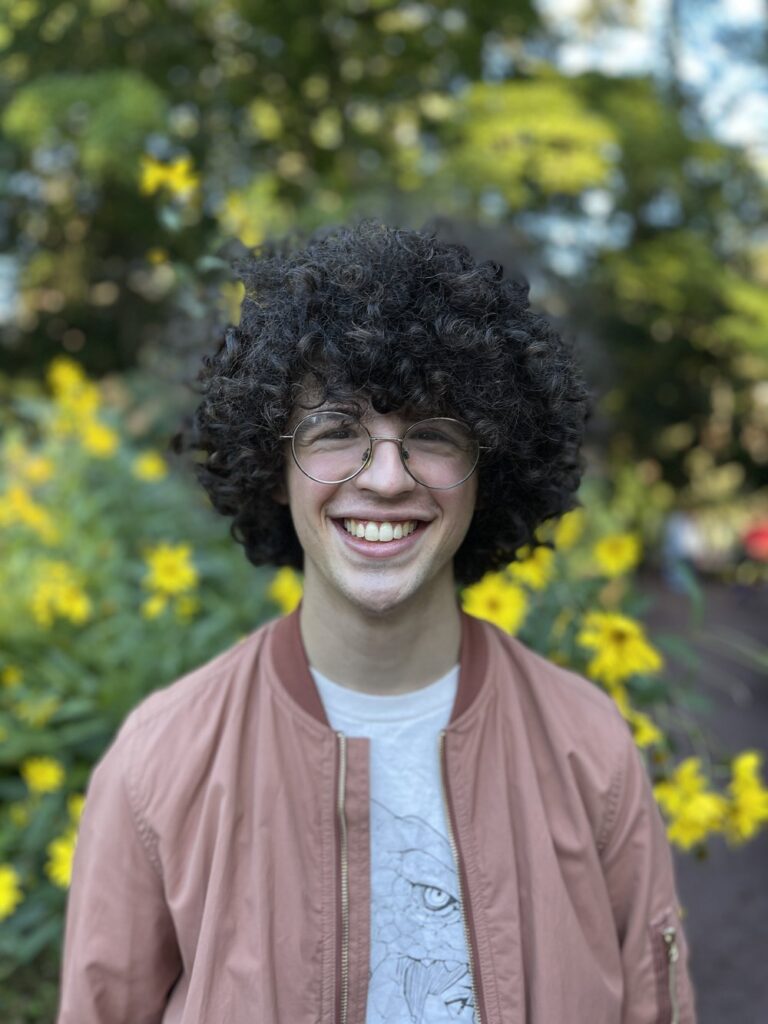
“I knew even before entering Princeton that I wanted to be a music major. Especially in my last two years of high school, I made an extremely hard pivot into centering my entire life around composition — so in a way I didn’t really have a choice!”
Milo Poniewozik wanted to be like Schroeder from Peanuts. True story. He started taking piano lessons at age nine, began composing at age ten, taught himself the fundamentals of electronic music production when he was around fourteen, and eventually (mostly by accident) began doing freelance work for various online communities shortly thereafter. At Princeton, Poniewozik spent his four years leading a double life as both student and freelance composer. He attended classes, completed assignments, and chipped away at independent work, all the while writing original songs, composing video game soundtracks, and remaking instrumentals of existing songs for a vast and growing community of YouTubers and other professional contacts. Poniewozik’s academic goals through the Music Major and his certificate in Japanese Language and Culture jibed closely with his freelance work yet simultaneously afforded the young musician with opportunities to push the boundaries of his style and output. His senior thesis, a seventeen-minute orchestral piece loosely based on ‘The Tale of the Bamboo Cutter’ (a Japanese folk tale about a girl from the moon who is exiled to Earth and learns about family, love, and humanity, before eventually being recalled home) was his proudest accomplishment to date — a challenge to write a much longer and structurally complex work. In coursework, too, including Darcy James Argue’s Introduction to Jazz Arranging, Composition and Harmony, Rob Wegman’s Music and Shakespeare (with just two people in the class), and the cross-listed Musical Instruments, Sound, Perception, and Creativity Poniewozik encountered ongoing inspiration, learnings, and technical skills that he would bring to bear on his own musical practices: “In STC204/MUS204 we had a composition exercise that involved writing a piece of music for an imaginary piano built around the acoustic (F lydian-dominant) scale, which I remember being a really interesting thought experiment. It drove home for me just how much the physical layout and construction of our keyboards and other instruments affect the music written for them.” Next year, Poniewozik will be teaching English in Japan through the Japan Exchange and Teaching Program. He will also continue his ongoing freelance work, with some very exciting projects lined up in the coming months. He’ll be busy, but as he swears, “matcha and black tea can get me through any time crunch.”
“For the past couple of years, Milo has been leading a double life as a student and a freelance composer, creating music for video games and producing music content for YouTubers. Undoubtedly, he will continue to make a significant impact in the video game music industry, but his versatile language in music has great potential for many industries, including film music. We eagerly await to see what he does next!”
— Juri Seo, Associate Professor of Music; Director of Graduate Studies (Composition)
Meet Helia Ruohui Cui

“Even in music, I’m still figuring out what exactly I want to do. But I’ve grown more tolerant of indecision — people don’t have everything figured out before they embark on their journey.”
Until pretty late in Helia Ruohui Cui’s Princeton career, she was majoring in Computer Science in the engineering school. Cui had applied to Princeton as a physics major, considered psychology and math, and ended up in computer science, all before finally transferring to Music her junior year. “The transition from the exact sciences to the colorful world of music wasn’t without difficulty, but I am very glad that I made the decision.” Cui has always been “enthralled” by the combination of the imaginative and the mathematical in music, and she was even more enticed by the idea of being part of a smaller, close-knit community, especially following the more isolated pandemic years of her underclassman years. Declaring as a Music Major relatively late was no deterrent to Cui’s success, however. Her thesis, a set of computer analysis programs that identified repetitions and visualized phrase structures in the annotated corpus of Mozart piano sonatas represented, as advisor Dmitri Tymoczko shared, “substantial progress on what promises to be a publishable article,” and she is eager to expand on the work following graduation. (Cui also earned a certificate in Applications of Computing, a natural complement to her musical interests.) Among her treasured music courses were advisor Tymoczko’s Composing Like Beethoven and Solon Snider Sway’s Creative Musical Leadership: “I was fascinated to learn the underlying structures embedded in Beethoven’s music, which changed my conception of how music can be constructed and in a way led to my thesis topic,” Cui shared. “In Creative Musical Leadership, I had my very first experience with conducting and directing a music ensemble, which confirmed my belief in the power of music to connect human beings.” After Princeton, Cui may pursue a graduate degree in music theory. For now, she is working on securing a music-related internship, possibly with a non-profit organization, while she plans her next steps on a new path that arrived better late than never!
“Helia made substantial progress on what promises to be a publishable article, using computational analysis to explore classical form. She is currently contemplating graduate school in music theory. If she does, her senior thesis will have been an important first step!”
— Dmitri Tymoczko, Professor of Music
Meet Kevin Flahive
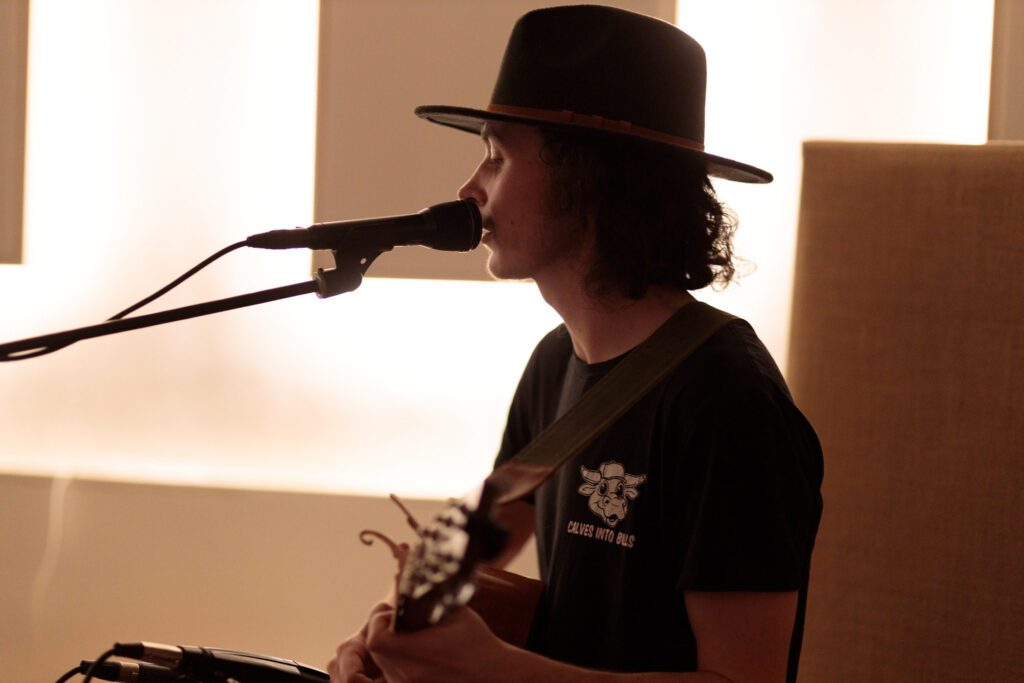
“I knew I wanted to declare as a music major when I found that I could complete creative projects (an EP and an album) as my junior independent work and senior thesis.”
If you’ve spent a summer on the Jersey Shore and visited Asbury Park, there’s a good chance you’ve come across the musical stylings of Music Major Kevin Flahive, who spent summers in between academic years busking on the boardwalk. Growing up with a mom and grandfather who were both singers and proud Princeton alumni, Flahive had a hunch that Princeton — and music — would be a possibility in his future. He’d been teaching himself instruments since the fifth grade and had always loved creating musical projects. When Flahive was accepted at Princeton and learned that he could pursue creative projects for his independent work within the Music Major, he was sold. Flahive spent his senior year writing and then recording (in L.A.) his thesis, ‘For the Road – A Recorded Album of 11 Songs.’ The album has folk and other related influences but offers a modern twist; it is, as advisor Dan Trueman puts it, “both old and new at once, a remarkable achievement.” Beyond his thesis, Flahive’s core memories of his Music Department experience are of the varied coursework that he participated in. His all-time favorite was Olivier Tarpaga’s Dundun Projects, which provided exciting challenges and ongoing opportunities for group music-making in a way that Flahive hadn’t previously experienced; outside of the department, Paul Muldoon and Bridget Kearney’s How to Write a Song Atelier course afforded the pinch-me moment of receiving feedback on original songs from the likes of Sir Paul McCartney and Maggie Rogers, reinforcing his most valuable Princeton lesson — that there is value in imperfection. This summer, you may find Flahive busking in Asbury Park or playing shows along the Jersey Shore. He’ll also be working part-time for the University developing an electronic music studio.
“I so enjoyed being a fly-on-the-wall with Kevin’s songwriting process, seeing and hearing the songs, lyrics, stories and sound develop over time. He is a wonderful story-teller and wordsmith, creating evocative places where we as listeners can invent our own narratives, and over the course of the year, his craft became sharper as he brought his songs into focus.”
— Dan Trueman, Department Chair; Professor of Music
Meet Christien Ayers
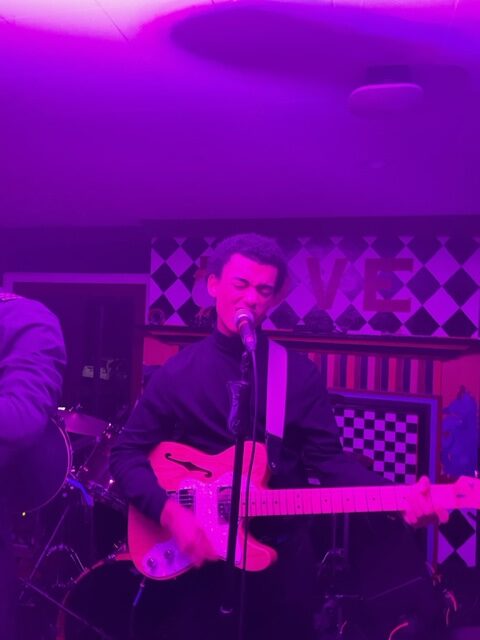
“I tried studying in a couple of other departments, but I spent all of my time working on music and focusing on my MUS-related classwork instead. Based on that, it seemed like majoring in Music was a no brainer.”
Christien Ayers, a Music Major with a certificate in Technology and Society, heard of a great-uncle who used to play saxophone; beyond that, his musical leanings are an anomaly in his family. Nevertheless, music was always the draw for Ayers, and though he tried to study in other departments, music always wound up lassoing his attention back in. Ayers’ senior thesis, an album titled ‘Fast, Loose: A Postmodern Future’ that he wrote, produced, and mixed this year, was his largest musical undertaking thus far, inspired, in part, by the previous year’s Junior Seminar. Taught by Juri Seo and Gavin Steingo, the seminar had provided space for students including Ayers to discuss music in philosophical terms, an exciting angle that jibed well with topics covered in another of his treasured courses, Michael Smith and Margaret Shea’s course on the Philosophy of Art. Together, these courses along with Ayers’ own readings heavily influenced the theoretical direction of his thesis, in which he uses generative coding and sampling technology to critically engage with 90s nostalgia as a tool for creating forward-thinking pop music. Ayers also prepared an independent project for his certificate in Technology and Society that dovetailed his interests in music and tech: an analysis of the role that the internet has played in shaping how society consumes music today. Beyond classes and independent work, Ayers has been an active performer in the Glee Club, Shere Khan, PURE, and various theater productions, leader of a music project called Ramona Jade (during his junior and senior years), wrangler of a band that wrote and performed original songs and covers across campus at various events, and recording artist for student groups and artists on campus through his job at the Ultraviolet Recording Studio. Ayers isn’t sure where he’ll end up next year, but two possibilities are Virginia, where he’d work in academia, and New York City. Wherever he goes, we’re excited to see — and hear — all the great things he will do!
“Getting to know Christien and his music has been a real pleasure. He’s a talented composer/producer with a markedly original voice and a sensibility that cannot be taught. His senior project and presentation was compelling and well done. I look forward to hearing his work out in the world.”
— Tyondai Braxton, Assistant Professor of Music
In Other News

What Six Senior Music Majors’ Say About Their Theses
May 16, 2024
As we near the final weeks of spring semester and anticipated graduation for the Class of 2024, the Music Department asked six Senior Music Majors to expand on their creative thesis, as well as share words of encouragement to future students.
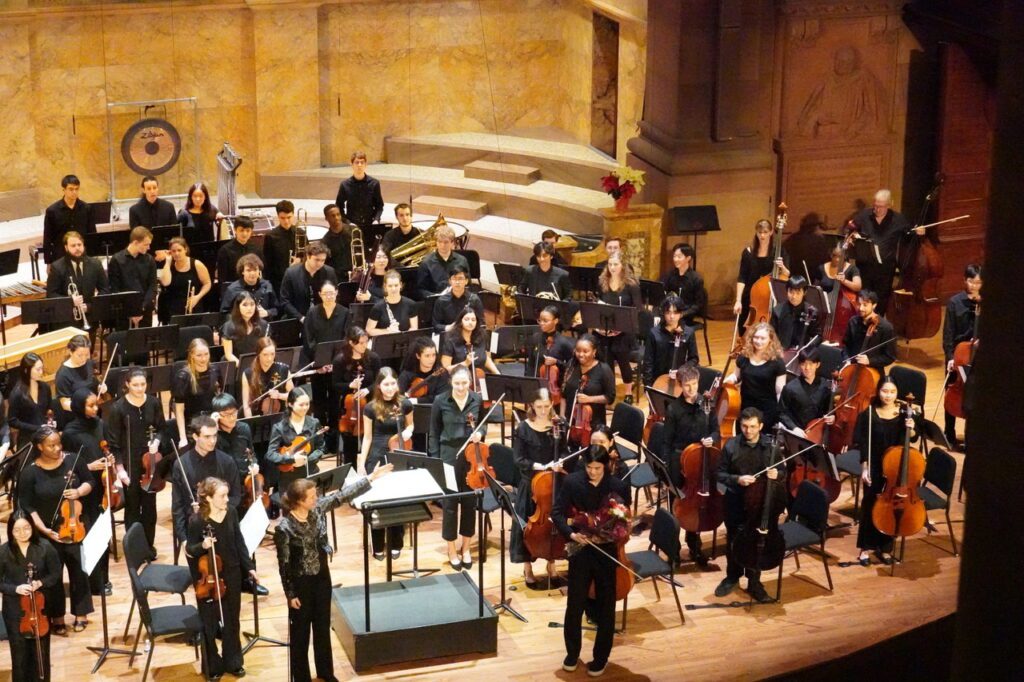
Student Perspectives: The Musical Odyssey of Princeton’s Adrian Thananopavarn
Jan 18, 2024
Adrian P. Thananopavarn ’24, Math major with certificates in Computer Science and Music Composition, premieres “March of Dusk” with Princeton University Sinfonia

How 3 Princeton Students Spend a Monday at the Royal College of Music
Dec 7, 2023
Dorothy Junginger ’25, Kyle Tsai ’25, and Audrey Yang ’25 are currently participating in Princeton’s immersive abroad program this semester at the Royal College of Music in London.

